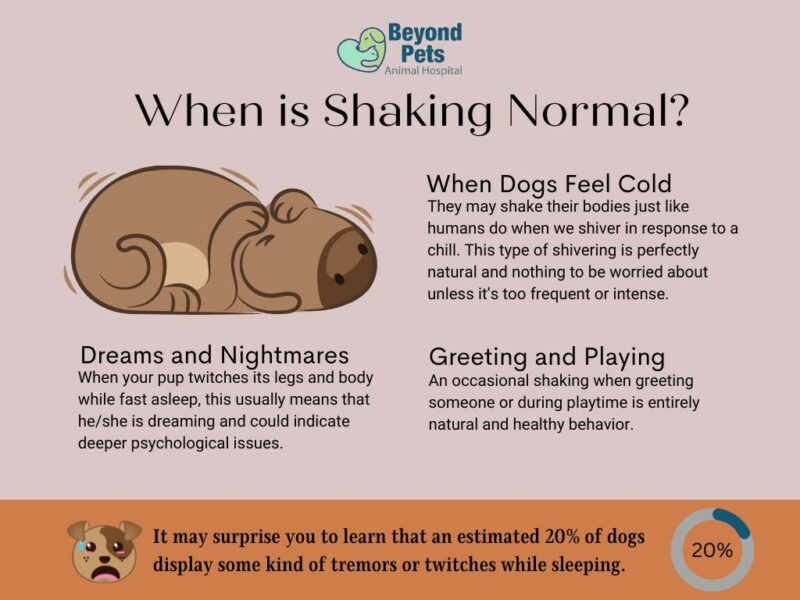Why is my dog shaking and throwing up? Your dog might be shaking and throwing up because of several reasons, ranging from simple anxiety or eating something bad to more serious issues like poisoning or kidney disease. Figuring out the cause is vital to get your dog the right help. This article explores the possible causes, how to identify them, and when you need to seek immediate veterinary care.

Image Source: img.beyondpets.com
Potential Reasons Your Dog is Shaking and Throwing Up
When your dog is experiencing both shaking and vomiting, it’s a sign that something is definitely wrong. Here’s a breakdown of potential reasons:
1. Dietary Indiscretion or Toxic Ingestion
Dogs sometimes eat things they shouldn’t, leading to stomach upset.
- What it is: Eating garbage, spoiled food, or toxic substances.
- Symptoms: Vomiting, shaking, diarrhea, loss of appetite, and belly pain.
- Toxins: Chocolate, grapes, raisins, onions, xylitol (artificial sweetener), and household cleaners are common culprits.
2. Gastrointestinal Issues
Problems within the digestive system can cause both symptoms.
- Causes: Infections, inflammation, blockages, or parasites.
- Conditions:
- Gastroenteritis: Inflammation of the stomach and intestines.
- Pancreatitis: Inflammation of the pancreas.
- Inflammatory Bowel Disease (IBD): Chronic inflammation of the digestive tract.
- Intestinal Blockage: Something stuck in the intestines.
- Symptoms: Vomiting, shaking, diarrhea, loss of appetite, and weakness.
3. Metabolic Disorders
These disorders affect how your dog’s body functions.
- Kidney Disease: The kidneys aren’t filtering waste properly.
- Liver Disease: The liver isn’t removing toxins.
- Diabetes: Issues with blood sugar levels.
- Symptoms: Vomiting, shaking, lethargy, increased thirst, and frequent urination.
4. Neurological Conditions
Problems in the brain or nervous system can cause tremors and nausea.
- Conditions:
- Seizures: Uncontrolled electrical activity in the brain.
- Encephalitis: Inflammation of the brain.
- Vestibular Disease: Affects balance and coordination.
- Symptoms: Shaking, tremors, vomiting, head tilt, and loss of coordination.
5. Anxiety and Stress: Dog Vomiting Shaking Anxiety
Emotional distress can manifest physically.
- Triggers: Loud noises (thunderstorms, fireworks), vet visits, travel, separation anxiety.
- Symptoms: Shaking, vomiting, panting, pacing, and hiding.
- Dog throwing up shaking scared: This is a common sign of anxiety in dogs.
6. Infections
Bacterial or viral infections can cause these symptoms.
- Common Infections: Parvovirus, distemper, kennel cough.
- Symptoms: Vomiting, shaking, fever, lethargy, diarrhea, and coughing.
7. Pain
Severe pain can lead to both shaking and vomiting.
- Causes: Arthritis, injuries, post-surgical pain.
- Symptoms: Shaking, vomiting, panting, whining, and reluctance to move.
8. Addison’s Disease
The adrenal glands don’t produce enough hormones.
- Symptoms: Vomiting, shaking, lethargy, weakness, loss of appetite.
Deciphering the Symptoms: What to Look For
To figure out why your dog is shaking and throwing up, observe other symptoms.
- Timing: When did the symptoms start? Were they sudden or gradual?
- Frequency: How often is your dog vomiting or shaking?
- Severity: How intense are the symptoms? Is your dog severely weak or just a little off?
- Other Symptoms: Diarrhea, loss of appetite, lethargy, fever, coughing, sneezing, increased thirst, or urination.
Specific Symptom Combinations
- Dog shaking throwing up lethargic: This combination suggests a serious underlying issue like an infection, metabolic disorder, or poisoning.
- Dog shaking throwing up scared: This points to anxiety or a phobia.
When to Worry: Identifying an Emergency
Some situations require immediate veterinary attention. Seek emergency care if your dog shows any of these signs:
- Severe Weakness or Collapse: Unable to stand or walk.
- Difficulty Breathing: Gasping for air or blue gums.
- Seizures: Uncontrolled shaking and muscle spasms.
- Blood in Vomit or Stool: Bright red or dark, tarry stools.
- Abdominal Distension: A swollen or painful belly.
- Known Toxin Ingestion: If you know your dog ate something poisonous.
- Unproductive Vomiting: Trying to vomit but nothing comes up.
- Prolonged Symptoms: Vomiting or shaking for more than 24 hours.
Getting a Diagnosis: What to Expect at the Vet
Your vet will perform a thorough examination to figure out what’s wrong. Here’s what might happen:
1. Physical Exam
- Checking vital signs (temperature, heart rate, respiratory rate).
- Palpating the abdomen to check for pain or abnormalities.
- Assessing hydration level.
- Looking for signs of injury or illness.
2. Diagnostic Tests
- Blood Tests: To check organ function, blood cell counts, and electrolyte levels.
- Urinalysis: To assess kidney function and look for infection.
- Fecal Exam: To check for parasites.
- X-rays: To look for blockages or abnormalities in the abdomen or chest.
- Ultrasound: To get a detailed look at internal organs.
- Specific Tests: Depending on the suspected cause, your vet may run specific tests for toxins, infections, or hormonal imbalances.
Dog Shaking Throwing Up Diagnosis: Finding the Root Cause
The diagnosis will depend on the exam and test results. Some possibilities include:
- Dietary Indiscretion: Based on history and symptoms.
- Gastroenteritis: Based on symptoms and ruling out other causes.
- Pancreatitis: Based on blood tests (elevated pancreatic enzymes).
- Kidney or Liver Disease: Based on blood tests and urinalysis.
- Infections: Based on blood tests, fecal exams, and specific tests for certain diseases (like parvovirus).
- Anxiety: Based on history and ruling out medical causes.
- Poisoning: Based on history, symptoms, and specific toxin tests if available.
Dog Shaking Throwing Up Treatment: Getting Your Dog Better
Treatment depends on the diagnosis.
1. Supportive Care
- Fluid Therapy: To correct dehydration.
- Anti-Nausea Medications: To control vomiting.
- Pain Relief: If pain is a factor.
- Bland Diet: Easily digestible food to rest the digestive system.
2. Specific Treatments
- Infections: Antibiotics or antiviral medications.
- Poisoning: Inducing vomiting, administering activated charcoal, or using specific antidotes.
- Metabolic Disorders: Medications to manage the condition (insulin for diabetes, medications to support kidney or liver function).
- Gastrointestinal Issues: Medications to reduce inflammation, deworming medications for parasites, or surgery for blockages.
- Anxiety: Anti-anxiety medications, behavior modification, and environmental changes to reduce stress.
Dog Shaking Throwing Up Home Remedies: What You Can Do (With Caution)
Important: Home remedies should only be used for mild cases and under veterinary guidance. Never attempt home treatment if your dog has severe symptoms.
- Withhold Food: Give the digestive system a rest for 12-24 hours.
- Offer Water: Provide small amounts of water frequently to prevent dehydration.
- Bland Diet: After the fasting period, offer small amounts of boiled chicken and rice.
- Probiotics: Can help restore healthy gut bacteria.
- Monitor Closely: Watch for any worsening of symptoms.
Dog Shaking Throwing Up Differentials: Other Possibilities to Consider
“Dog shaking throwing up differentials” refers to the list of possible conditions your vet will consider when figuring out what’s wrong. These include:
- Hypoglycemia: Low blood sugar, especially in puppies or diabetic dogs.
- Heatstroke: Overheating can cause vomiting and shaking.
- Bloat (Gastric Dilatation-Volvulus): A life-threatening condition where the stomach fills with gas and twists (common in large, deep-chested breeds).
- Peritonitis: Inflammation of the lining of the abdomen.
Preventing Shaking and Vomiting
While you can’t prevent every cause, here are some tips:
- Prevent Dietary Indiscretion: Keep garbage and toxic substances out of reach.
- Feed a High-Quality Diet: Avoid sudden diet changes.
- Manage Stress: Provide a safe and comfortable environment.
- Regular Vet Checkups: Catch potential problems early.
- Vaccinations and Parasite Control: Protect against common infections.
Coping with Anxious Dogs
If anxiety is the cause, here’s how to help:
- Identify Triggers: What makes your dog anxious?
- Create a Safe Space: A quiet den where your dog can retreat.
- Desensitization and Counterconditioning: Gradually expose your dog to triggers in a positive way.
- Pheromone Therapy: Products like Adaptil can help reduce anxiety.
- Consult a Veterinary Behaviorist: For more severe cases.
Frequently Asked Questions (FAQ)
Q: What can I give my dog for vomiting and shaking?
A: For mild cases, you can withhold food for 12-24 hours and offer small amounts of water. After that, try a bland diet of boiled chicken and rice. Consult your vet before giving any medications.
Q: Can anxiety cause a dog to shake and throw up?
A: Yes, anxiety can cause shaking, vomiting, and other physical symptoms in dogs.
Q: When should I take my dog to the vet for vomiting and shaking?
A: Seek immediate veterinary care if your dog has severe weakness, difficulty breathing, seizures, blood in vomit or stool, abdominal distension, known toxin ingestion, or if symptoms persist for more than 24 hours.
Q: What does it mean when a dog is shaking uncontrollably?
A: Uncontrolled shaking can be a sign of many things, including anxiety, pain, neurological problems, infections, or poisoning. It always warrants veterinary attention.
Q: What is the treatment for a dog shaking and throwing up?
A: Treatment depends on the cause. It may include supportive care (fluids, anti-nausea medication), specific medications for infections or metabolic disorders, or surgery for blockages.
Q: What are common dog shaking vomiting causes?
A: Common causes include dietary indiscretion, gastrointestinal issues, infections, anxiety, metabolic disorders, and neurological conditions.
By closely observing your dog and seeking veterinary care when needed, you can help your furry friend recover quickly and get back to their happy, healthy self.
